Property Insurance is a fundamental type of coverage for restaurants, safeguarding your business’s physical assets against various risks. Given the unique and often hazardous environment of a restaurant, having the right property insurance is crucial for mitigating potential losses. This guide explores the key aspects of Property Insurance, why it’s essential for restaurants, and how to choose the right policy for your needs.
What is Property Insurance?
Property Insurance, often referred to as Commercial Property Insurance, protects your restaurant’s physical assets from risks such as fire, theft, vandalism, and certain types of natural disasters. This coverage typically includes the building itself, along with its contents and any other structures on the property.
Key Coverage Areas
- Building Coverage: This covers damage to the physical structure of your restaurant, including walls, roof, and foundations. If a fire or severe storm damages the building, this coverage helps pay for repairs or rebuilding costs.
- Business Personal Property: Covers damage to the contents within your restaurant, such as kitchen equipment, furniture, and inventory. For instance, if a burst pipe damages your ovens and dining tables, this insurance can help with repair or replacement costs.
- Loss of Income (Business Interruption): This component covers the loss of income if your restaurant is unable to operate due to a covered event, like a fire or natural disaster. It helps replace lost revenue and covers ongoing expenses such as rent and utilities during the period of business interruption.
- Equipment Breakdown: Protects against the cost of repairing or replacing essential equipment that breaks down due to mechanical failure or other covered reasons. This can be critical for restaurants that rely on specialized kitchen appliances for their operations.
- Contents in Transit: Covers property that is being transported to or from your restaurant. If you’re moving inventory or equipment and it gets damaged in transit, this coverage helps cover the loss.
- Outdoor Property: Includes coverage for items like signage, fences, and landscaping that are located outside your restaurant. Damage from events like storms or vandalism can be covered under this category.
Why is Property Insurance Important for Restaurants?
Restaurants face unique risks that make Property Insurance particularly crucial:
- High Value of Assets: Restaurants often invest heavily in kitchen equipment, décor, and inventory. Property Insurance helps protect these significant investments from unexpected events that could lead to substantial financial losses.
- Vulnerability to Risks: The nature of restaurant operations involves numerous risks, including fire from cooking equipment, water damage from plumbing issues, and theft. Property Insurance provides protection against these common threats.
- Business Continuity: A major incident, such as a fire or severe storm, can disrupt your business operations and lead to significant downtime. Property Insurance with business interruption coverage ensures you can manage expenses and recover lost income while your restaurant is being repaired or rebuilt.
- Compliance and Lease Requirements: Many commercial leases require businesses to carry Property Insurance. Having adequate coverage ensures you comply with these requirements and avoid potential disputes with your landlord.
Choosing the Right Property Insurance Policy
Selecting the right Property Insurance policy involves several important considerations:
- Evaluate Your Risks: Assess the specific risks associated with your restaurant, such as the type of cooking equipment you use, your location’s susceptibility to natural disasters, and potential security concerns. This assessment helps determine the level of coverage you need.
- Understand Coverage Limits: Insurance policies have coverage limits, which are the maximum amounts your insurer will pay for a claim. Ensure that your policy limits are sufficient to cover the full value of your building, equipment, and inventory. You may need to adjust these limits based on changes in your restaurant’s assets.
- Review Policy Exclusions: Be aware of any exclusions in your policy. Common exclusions may include certain types of natural disasters (e.g., earthquakes or floods) or damage caused by intentional acts. Understanding these exclusions helps you identify any additional coverage you might need.
- Consider Replacement Cost vs. Actual Cash Value: Property Insurance policies typically offer two types of reimbursement: replacement cost or actual cash value. Replacement cost covers the full cost of replacing damaged property without deducting for depreciation, while actual cash value takes depreciation into account. Replacement cost coverage is generally preferred for restaurants due to the high value of equipment and inventory.
- Look for Additional Coverage Options: Depending on your specific needs, you might require additional coverage options such as Equipment Breakdown Insurance, Flood Insurance, or Business Interruption Insurance. These add-ons can provide more comprehensive protection.
- Shop Around and Compare Policies: Different insurers offer various levels of coverage and pricing. It’s important to shop around and compare policies to find one that meets your needs at a competitive cost. Working with an insurance broker who specializes in restaurant insurance can help you find the best policy for your situation.
- Maintain Regular Updates: Regularly update your insurance policy to reflect changes in your restaurant’s assets or operations. If you acquire new equipment, make renovations, or experience other significant changes, ensure that your coverage is adjusted accordingly.
Conclusion
Property Insurance is a critical component of risk management for restaurants. It provides essential protection for your building, equipment, inventory, and other valuable assets against a range of potential risks. By understanding the key coverage areas, evaluating your specific needs, and carefully selecting a policy, you can safeguard your restaurant’s financial health and ensure that you are well-prepared for unforeseen events. Investing in comprehensive Property Insurance not only protects your business but also supports its continued success and stability.



